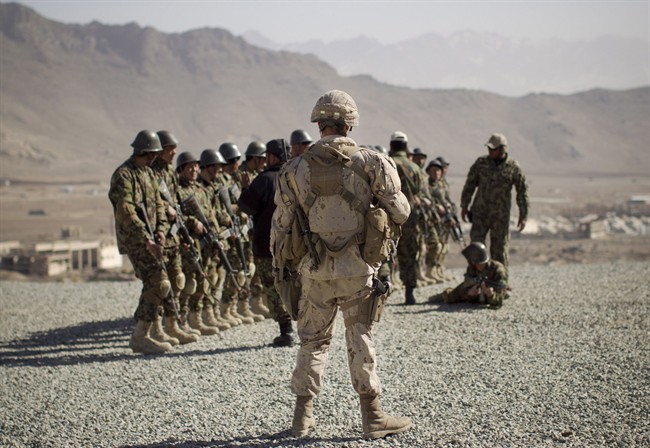Canada would need to think carefully before expanding training programs designed to help local ground troops in the fight against ISIS, experts suggest.

When it comes to fighting the violent terrorist organization, the leaders of the three major parties agree on one point: Canada cannot sit idle while a U.S.-led coalition attempts to, as American president Barack Obama put it, “degrade and destroy” ISIS.
But how exactly our country should contribute has been a point of contention. Both NDP leader Tom Mulcair and Liberal leader Justin Trudeau advocated an end to Canadian bombing missions during Monday’s foreign policy debate, with Mulcair arguing that Ottawa should pull out of the mission entirely and focus on humanitarian aid, deradicalization and peacekeeping.
Trudeau found his way to middle ground, saying that in addition to aid and refugee support, Canada can best help “by doing more of the kind of training of infantry troops on the ground that we developed tremendous capacities to do in Afghanistan and in other places.”
The Liberal leader did not make it clear in the debate which groups fighting ISIS his government would like to help train, or if by “infantry” he meant all ground troops or only those engaging directly with the enemy. Regardless, a renewed emphasis on training would mean very different things in Syria and Iraq, said Christian Leuprecht, a professor at the Royal Military College of Canada and Queen’s University, and a senior fellow at the Macdonald Laurier Institute.
There is currently no Canadian training mission underway in Syria, so any change to that approach “would be a substantial expansion of the Canadian commitment in the region,” Leuprecht noted.
“The training mission in Syria that Americans have (undertaken) is not going well.” he said.
“Of the 500 people they have trained so far, by their own testimony before Congress, only between 50 and 60 are left. The others have died or have left the fight. If there is to be a training mission in Syria, we would want to think that through very carefully.”
Thomas Juneau, assistant professor of public and international affairs at the University of Ottawa, agreed, saying it “would be stepping into a league of serious global politics that we don’t usually do, and I don’t think that’s on the table right now, either from the Conservatives or the Liberals.”
Unlike Afghanistan, where Canada had the support of the local government, Ottawa would not be able to liaise with Syrian leader Bashar al-Assad, who stands accused of war crimes.
Adding more resources to training programs already underway with Kurdish forces in northern Iraq could be a positive move, Juneau said, as there are currently only 69 special forces troops deployed to help train and advise. But as with all such programs, there will need to be enough local recruits to warrant more Canadians heading over. And getting results will take time.
Similar training initiatives in the past have produced mixed results. According to Robert Bergen, research fellow at the University of Calgary’s Centre for Military and Strategic Studies, one of the main challenges in delivering them in Afghanistan was the low level of literacy among local troops.
“They could sometimes not read their own language, let alone English,” Bergen said.
“You’re going to need interpreters, you’re going to have to teach some math, probably first aid – that’s a key element of a solider’s training. Also discipline under fire, and international law.”
Still, both Juneau and Leuprecht noted, it’s true Canada has honed its ability to deliver such programs and is using those skills right now in Ukraine.
What about peacekeeping?
Conservative leader Stephen Harper argued Monday night that, right now, no peacekeeping mission is possible in territories controlled by ISIS. That’s true, as long as Harper is defining “peacekeeping” in the strictest sense. For a peacekeeping mission to occur, the parties involved in a conflict must agree to invite peacekeepers in to ensure that a peace to which they have agreed is actually kept,” said Leuprecht.
“By that classic definition, there is no peace to keep in Syria right now.”
In Iraq, meanwhile, there are several groups in conflict with one another. But when it comes to the Islamic State, said Leuprecht, the parties on the ground are nowhere close to a truce.
“They’re not even talking to each other.”



Comments